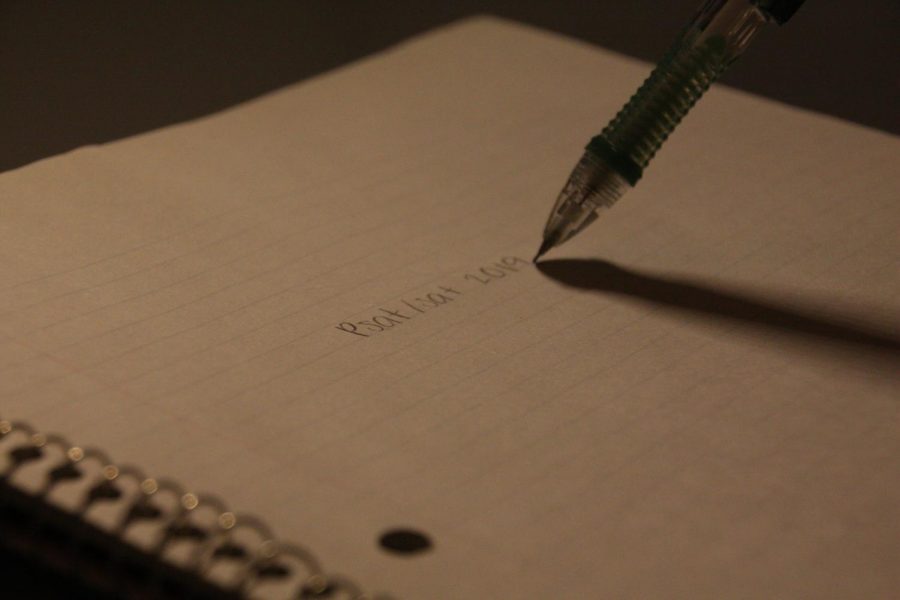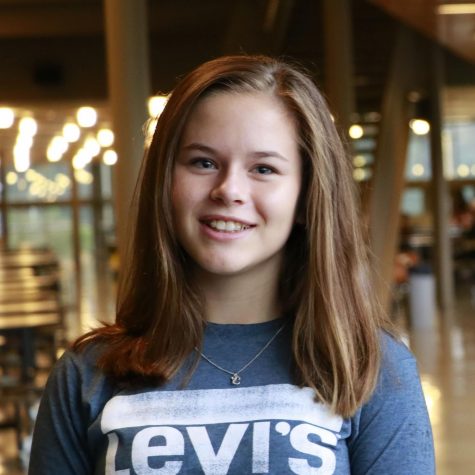How to Succeed on the SATs
PREPARATION IS KEY Freshman Ruby May uses flashcards and notes to study for exams.
November 1, 2019
The Scholastic Aptitude Test and Practice Scholastic Aptitude Test are international high school exams that help colleges decide who to admit. These tests involve math sections and evidence-based reading and writing sections. PSATs are practice versions of the SATs, their purpose being to prepare sophomores and juniors for the final test, the SAT, which is typically taken near the end of junior year. The differences are small – the PSATs are fifteen minutes shorter, do not have an essay (which is optional on the SATs), and the scoring scale is a bit different. Otherwise, they are nearly identical, which is why the PSATs are a perfect way to practice. SATs are often times the deciding factor for college admissions and can even earn you a scholarship, with about 50,000 out of 1.6 million kids earning these scholarships. PSAT scores decide whether you qualify for National Merit Scholarships and are scored on a scale of 320-1520. They last a little under three hours. SAT scores decide college admissions and scholarships and are scaled on a score 400-1600. They last three hours without essays and almost four hours with an essay.
The Princeton Review, a college admission service, suggests starting practice and studying in the spring or summer of sophomore year. They also provide practice test programs, which can help you prepare. Practice tests give you an understanding of the test format, the instructions, what help will be provided, and the type of questions you will be expected to answer. This will give students an extra boost of confidence, which is one way to reduce anxiety going into a test; as freshman Jayden Jackson said, “Just believe in yourself.”
Students from Issaquah High gave tips on how to relieve stress: To calm you nerves, Sophomore Ben Hiegel suggests, “Take deep breaths when you’re stressed out.” Junior Ishaan Sharma agreed, adding “I like to talk through my stress with people.” Sophomore Sophia Chow focused on independent relaxation time, saying “I take baths or sleep. Or both.” Senior Jonah Powazek, however, likes to “spend time with friends and do things I enjoy. It’s important to relax and put school and college out of my mind for a bit.”
Having scheduled times to study for the SAT will ensure that you will get time in to practice and familiarize yourself with the tests. For example, Sharma said, “I do practice questions every other day and I take practice tests every weekend. I’ve also purchased some textbooks to study off of.” By doing so, he felt prepared for the test. Once a student is comfortable with test questions, one option is to set a timer and see if you are pacing yourself properly. There are also books offered by the College Board that contain practice tests and can help you study. If motivation does not come easily to you, public and private tutoring is offered in the Issaquah area. Instructors can be very helpful if you are struggling with questions.
Preparing for math sections and English sections are, of course, different. The SAT provides you with some math formulas, but it is still important to have basic formulas and concepts up to Algebra 2 memorized. Look over notes, textbooks, and homework, and practice using those formulas. As for English, read some challenging books. Highlight words you do not understand. Analyze and make sure you understand the basic rules of English grammar. Powazek, who has taken the SAT, said, “The reading and writing sections is hit or miss. The question could be really obvious or make no sense at all. For me, the math section is pretty easy because it only goes up to Algebra 2, and I’m in AP Calculus BC, so I already know that stuff.”
If you are not planning on taking the SATs and are instead leaning towards the ACT, or if you are not sure which is the better fit for you, you may be concerned since Issaquah High does not provide PACTs (they do not exist). ACT Inc. offers six free and official practice tests that are designed to prepare you. Senior Vail Kuntz took the ACT rather than the SATs. He said, “The main difference is that the ACTs are more STEM-oriented, which is the path I want to take, so it was better for me.” Kuntz said that “taking the PSATs wasn’t really helpful since I decided to not take the SATs. However, it did give me an idea of what the SATs would be like, which made me look into the ACTs and eventually realize that would be a better fit for me.” His advice for studying is, “Take lots of practice tests. That helped me recognize patterns in organizations, so, for example, I would know that the first section was always the hardest for me, so I would skip it and then come back [to it].”
On the matter of the impact of the SAT on colleges, many students see room for improvement. Chow believes “people are more than just test scores. Our lives don’t and shouldn’t revolve around the SATs.” Powazek also said no, explaining that “there’s a limited amount of time that colleges have to look at each applicant. The SATs are just a quick glance at a student’s skills. And, it’s a standardized test, so the tests only measure a student’s intelligence to a certain extent. It doesn’t give students like me who are studying a higher level of math to demonstrate that.” Kuntz said “My score is helping me find colleges. At this point it’s compensating for my GPA.” Sharma pointed out that “the higher income your family has the more access you’ll have to test practice, which isn’t fair.” The only practice the school provides are the PSATs (which requires a small fee), so it takes time and possibly money to properly prepare. According to the students, the SATs demonstrate a student’s work ethic and intelligence, but does not capture the whole picture. Either way, it is important to do as well as you can on the SAT or ACT, and following the tips and advice from fellow students is a great way to start.




